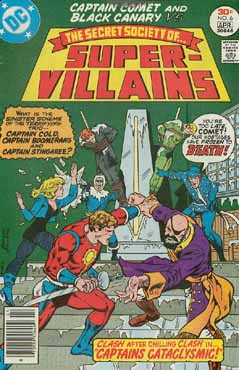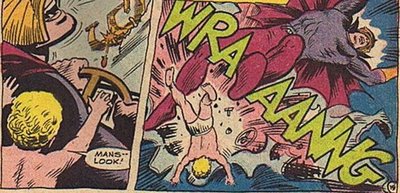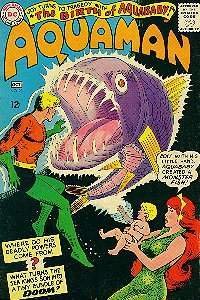
Are you ready for ... Golden Age Wonder Woman Week?
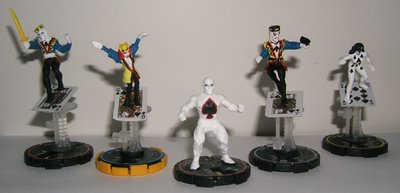


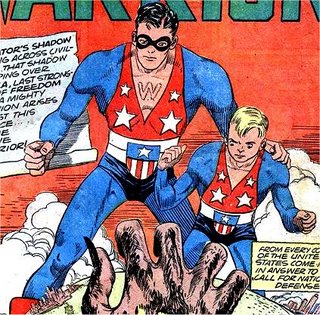
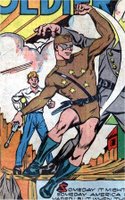 Unknown Soldier
Unknown Soldier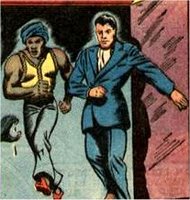 Mr. Risk
Mr. Risk
 Marvo
Marvo So unique is the comic book medium and the superhero genre, there are things people say in comics that you're not likely to read anywhere else.
So unique is the comic book medium and the superhero genre, there are things people say in comics that you're not likely to read anywhere else."Push it."
"What?"
"I said, 'push it'."
"Push what?"
"The button."
"The button. Which button?"
"What do you mean 'which button'? Any button."
"What good will that do?"
"I don't know. Just push it."
"Why don't you?"
"Why don't I what?"
"Push it."
"Push what?"
"The button."
"Which one?"
There's just an entire world of assumptions and enigmas wrapped up in this little package. Who thinks in terms of paravanes, let alone refers to them the way you and I would a paper clip or a coathanger? Why choose magnanese to make one? Is it one of the principal exports of Bolivia or I am confusing it with bauxite? Why does it take less time to turn oneself into a manganese paravane than anything else?
Metamorpho stories are full of such bizarre chestnuts and this one pretty much represents them all.
In most fiction, exposition is the coffee that helps keeps the plot zipping along. But the Silver Age didn't drink coffee; it drank only dark roast Columbian triple espressos with 8 packs of raw cane sugar per demitasse. There's more action represented in this one word balloon than in issues 0, 1, & 2 of the new Justice League of America and more questions raised than at a Marvel stockholders meeting. Why does Gregg spell his name with an extra G; is he actually from the planet Carggg? Where does Jor-El find time in his busy schedule of doom-warning to spy on Kansasites? Do alien cultures lack telenovellas, and instead use some impossible translight observational technology to watch The Real World: Earth, and, if so, are they secretly responsible for Judd Winick's continued employment?
Oh, and, of course, twenty-something bankers recently arrived in small farming communities who've already erected FRAKKING STATUES OF THEMSELVES IN TOWN. It's remarkable how often statues are a plot device in Silver and Bronze age stories....
That's how I always prove my love: by feeding pictures of my old boyfriends to ostriches. No one phrase could adequately represent the absurdity of the entire French Farce/ Love Polygon approach to the Superman mythos that was the Silver Age. But this comes close.
As previously discussed.
Sundellian Axiom 1.
All comic characters live in their own world to the complete exclusion of all other comic characters. Consequently, Batman, in his strips, is the total of heroic qualities; however, if Batman were to be compared with Superman, in the same story, Batman would immediately become a subservient character. Therefore the writer must create his own world for his heroes, a world in which the hero is the only hero.
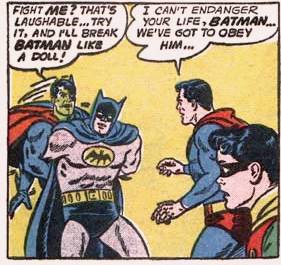 In the heyday of World's Finest, for example, Batman was clearly outclassed by Superman. My favorite such moment is in the famous Composite Superman story, where the villain says to Superman: "Fight me? That's laughable. Try it and I'll break Batman like a doll!" Gotta give C-S props for telling it like it is.
In the heyday of World's Finest, for example, Batman was clearly outclassed by Superman. My favorite such moment is in the famous Composite Superman story, where the villain says to Superman: "Fight me? That's laughable. Try it and I'll break Batman like a doll!" Gotta give C-S props for telling it like it is.Sundellian Axiom 2Hm. Let's just put this one write in the enevelope marked, "Special Delivery: Joe Quesada" and move on, okay? Actually, before we do, I'll note that many of my favorite characters fall into the Victims of Axiom 2 Category, such as Vibe, Aquaman, the Riddler, and Killer Moth. There's nothing intrinsically wrong with any of those characters; their principal problem is the lack of respect their writers have had for them.
Comic heroes must be treated by their writers with respect. Too often a writer thinks, "Well, he's just another comic-mag hero, the kids have seen hundreds of them."
Sundellian Axiom 3.It kind of amazes me how out of pride writers will flout conventions of the genre like this one: "That may be true for lesser writers and lesser characters, but my writing and character are different and therefore more interesting." Uh-huh. Well, short basketball players are different and interesting, too.
A hero must represent to the reader an image with which he can associate himself. Therefore he should be constructed as to be recognizable as a human being. He should have a home, or at least a setting. He should have characters to which to tie himself, friends, a father influence that makes him more understandable and sympathetic to readers. This explains the double identity formula adopted by most superheroes. Because once in uniform the hero becomes too perfect to have any human frailties, he adopts another character, much more human and understandable, so that the readers can know him better. In uniform Superman is far too perfect for one to associate himself directly with him. But as Clark Kent, a nearsighted guy who can't get to first base with Lois Lane, the readers can see themselves, and gloat in the secret that they, too, are really Superman.
Sundellian Axiom 4
This is the most neglected principle of story in the comic magazine business: too often a story ends "smack" with the climax action. The reader turns the page, anxious to taper off his story, and discovers himself on page one of the next story. The denouement is the breathing spell, the return to normalcy, the tying up of loose ends, explanations, coming together of the characters at the end of the story. It should not be neglected. It does not need to be more than three or four panels, a page at most. In the denouement the opening suggestions of the next story can be planted, so that the reader is instilled with a desire to purchase that next issue. This means more than just a final caption, it means that somewhere in the story we allowed one thread to run loose. In tracing down this thread we find that it is the forerunner of an entirely new story. Thus we have created a reason for sales of the next issue.
On the whole, most writers get this and do this, I think; am I mistaken?
Sundellian Axiom 5
A successful comic character needs more than just good action plotting. He needs constant character development that will keep him as interesting to the readers two years hence as he was in his first issue.
A good method of obtaining constant characterization is through the Dick Tracy, Terry and the Pirates formula of creation of sympathetic characters, from story to story, dropping these characters for three or four months, and then at a later date involving them in another story. In this way the constant reader feels that he has been rewarded for his faith in the magazine, and the transient reader feels that he has missed something, and perhaps this would be a good magazine to read steadily.
Golden Age writers weren't stupid. Neither were they fanboys of their characters, taking their long-term appeal for granted. They understood that (1) there had to be character development and (2) it was best done with ancillary characters so that the principal and supporting characters could remain recognizable.
Sundell Axiom 6
Villains must think and act in a spectacular manner, since if they are ordinary, all actions stemming from them are ordinary, and consequently the more cunning and clever they are, so the action of the story becomes more clever and cunning. As in all good writing, action stems from response of character to situation - so it must in comics.Conceive a good villain and drop him into a mediocre situation, and if the writer is sincere, this well-conceived villain will develop a well-rounded story from his reactions to the mediocre situation. A comic lead story which depends on melodrama can be no stronger than its most melodramatic figure - therefore the importance of strong super-villains.
Axiom 6 is why I suspect that Gail Simone, who understands it, is secretly the illegitimate child of Mr. Sundell. It's also the basis for a story I desperately want to read: "Killer Moth and Cavalier Go Shopping At Wal-Mart".
Sundellian Axiom 7Or the non-rescuing. Poor Gwen Stacy, Aquababy, & Spoiler.These are characters who are vulnerable. These are the friends, and consequently the weak points, of the hero. While a hero himself cannot be hurt by bullets, these same bullets can kill his sweetheart. Thus suspense grows from danger in which important sub-characters are placed, not upon the dangers which threaten the hero himself - except how these dangers threaten him in relation to the accomplishment of his task, which very often is the rescuing of the sub-character.
Sundell Axiom 8
Boy and Girl Assistants, and generally uniformed super-assistants to lead characters, should be treated in the same manner as heroes. These characters must be written into the plot. It is insufficient to have Davey tail along with Magno and merely swing in on the action as just another fist. The story must be written that Davey serves a definite purpose. Each character must serve in some way to further the story. A character who is merely an appendage is useless, and while they may not be detrimental to the story, they certainly do not help it. Very often, while the hero is invulnerable, the boy or girl assistant is otherwise. Consequently, if properly used, the assistant can serve as an Achilles heel. Too much stress on this point only succeeds in making the boy assistant a millstone around the neck of the hero, and instead of being an heroic figure in the eyes of the reader, he becomes a bothersome one.
 Is it true that Brian Michael Bendis is working on a Magno & Davey revival?
Is it true that Brian Michael Bendis is working on a Magno & Davey revival?Sundellian Axiom 9
Too often characters are introduced into a story by an incident and then allowed to drop out entirely. This is wasteful writing. In the April issue of Lightning Comics, the Eel destroys a ferryboat. For a panel or two we see a mother who has lost three sons in the action. She speaks a piece and a character is born with a strong motivation for disliking the villain, in fact a far stronger motivation than the hero has. But she is not utilized from that point on. This is a perfect example of bad writing. Due to this characterization of the woman, we create human interest. The readers waits expectantly through the entire story for the woman to reappear, and when she does not, he is disappointed.
Sundellian Axiom 10
Suspense in comics is not attained by placing the hero in mortal danger. The reader realizes that the hero will not be injured. Suspense is attained by creating a situation in which the problem is, not whether the hero will be killed, but how he will escape in jeopardy. Or how he can escape in sufficient time, to save those vulnerable beings who are also placed in jeopardy. Or how he can escape in sufficient time to frustrate the villain's plan, which is drawing to its culmination.
Sundell Axiom 11
A writer of action should also consider that good writing style can often make a chase and a fight interesting in the written story. However, when translated to pictures, the same chase and fight become unimportant when buried an a magazine full of chase and fight. In writing comic action, the writer makes his setting of primary importance. All action taking place within this setting will be indigenous to it and consequently different pictorially from action that takes place elsewhere. In a steel mill, action will be conveyed through molten metal, swinging cranes, giant machines, etc. Aboard ship, action all take place in staterooms, engine rooms, around the rigging of the ship. Too much action loses its importance. In a room full of shouting men, no one is heard; in a room full of whispering men, the shouter immediately gets attention. Action therefore should be played against a background of other elements, humor, mood, suspense - so that when the action occurs, it is important.
 Jim Lee.
Jim Lee.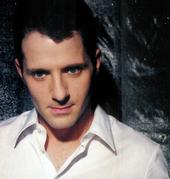
 Brian K. Vaughn.
Brian K. Vaughn.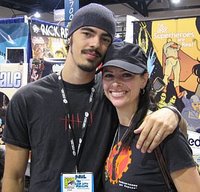
 Paul Harmon
Paul Harmon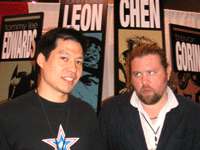
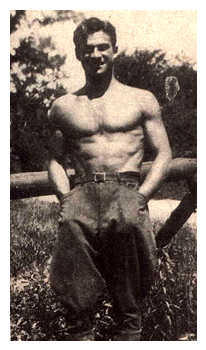 Woof!
Woof!
 It wasn't just Bruce Wayne; all the old gang were stand-up regular upperclass joes. Sure Clark Kent was originally a farmboy, but in the Golden Age, he used to sport his tuxedo all around down, shufflefooting on high society dancefloors and getting grapefruits shmushed in his face by toothpick-chewing toughs. Alan Scott, engineer/broadcaster, stank of privilege, and his replacement, Hal Jordan, spent half his conscious hours in a white dinner jacket doing the samba with society swells.
It wasn't just Bruce Wayne; all the old gang were stand-up regular upperclass joes. Sure Clark Kent was originally a farmboy, but in the Golden Age, he used to sport his tuxedo all around down, shufflefooting on high society dancefloors and getting grapefruits shmushed in his face by toothpick-chewing toughs. Alan Scott, engineer/broadcaster, stank of privilege, and his replacement, Hal Jordan, spent half his conscious hours in a white dinner jacket doing the samba with society swells.
 I'm glad I did! The show seems to have hit its stride. The manga (or is it japanime? Whatever...) influences seem to have been toned down. The addition of Robin is an enormous help (as I suppose it was in 1940); nice to see him as both The Kid Who Saves Batman's Butt and the Kid Who Batman Needs to Save While the Villain Gets Away.
I'm glad I did! The show seems to have hit its stride. The manga (or is it japanime? Whatever...) influences seem to have been toned down. The addition of Robin is an enormous help (as I suppose it was in 1940); nice to see him as both The Kid Who Saves Batman's Butt and the Kid Who Batman Needs to Save While the Villain Gets Away. Initially, I wasn't keen on the idea of an android Brainaic 5. But then it occurred to me that when Brainaic 5 was introduced in the comics, it wasn't yet known that Brainaic was an android. An ersatz explanation (several in fact) was crafted as to how (and why) an android would have a humanoid descendent, but the entire thing always felt strained. Even for the Legion, where origins include space whales, electrified rhinos, and parents deceiving their children into thinking they're androids. Like it or not, it makes much more sense that B5 would be an android than that he wouldn't.
Initially, I wasn't keen on the idea of an android Brainaic 5. But then it occurred to me that when Brainaic 5 was introduced in the comics, it wasn't yet known that Brainaic was an android. An ersatz explanation (several in fact) was crafted as to how (and why) an android would have a humanoid descendent, but the entire thing always felt strained. Even for the Legion, where origins include space whales, electrified rhinos, and parents deceiving their children into thinking they're androids. Like it or not, it makes much more sense that B5 would be an android than that he wouldn't.

 "Indeed. The plot aside, what do you think of this sword-wielding fellow, the New Aquaman?"
"Indeed. The plot aside, what do you think of this sword-wielding fellow, the New Aquaman?"




 "Me, too, sir; and soon!"
"Me, too, sir; and soon!" Not even I am gay enough to say,
Not even I am gay enough to say, "I'm the Cavalier; no one must ever suspect I'm gay!",
"I'm the Cavalier; no one must ever suspect I'm gay!", 
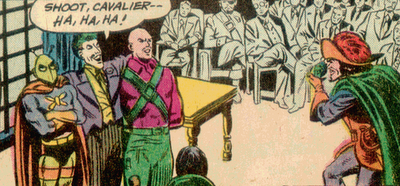 Note Captain Stingaree in the background, legs crossed in pained jealousy:
Note Captain Stingaree in the background, legs crossed in pained jealousy: 